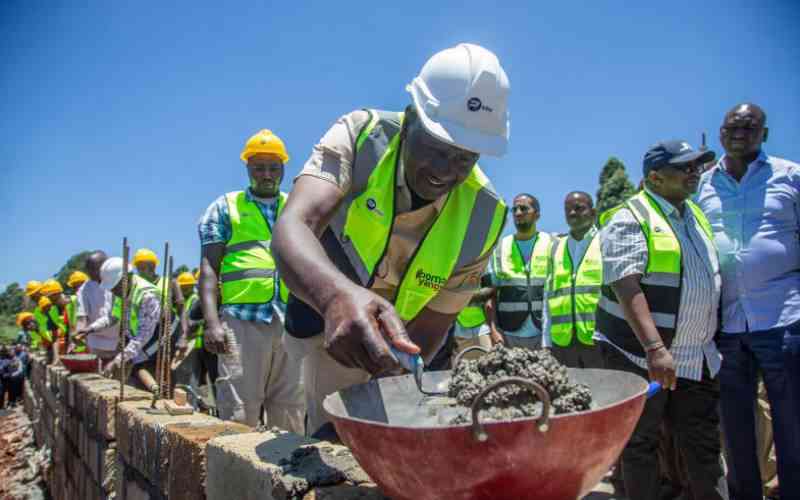
A Parliamentary health committee is today meeting to discuss a raft of recommendations seeking to tame the rising cases of cancer in the country.
The recommendations are contained in the Cancer Prevention and Control (Amendment) Bill, 2019.
The Bill proposes among other things the setting up of cancer centres in all the 47 counties to lessen the burden exerted on Kenyatta National Hospital as the main public referral hospital that offers cancer treatment.
Here are some of the key changes it recommends for better cancer control and prevention:
- Counties will be heavily responsible for the management of cancer as the national government delegates some of its duties.
- The prevention, diagnostic, treatment, rehabilitation and control of cancer will be a prerogative of county governments.
- Each county government shall establish a county cancer centre within the respective county.
- Currently, under the national government, procurement of equipment for prevention and control of cancer will be cascaded down to the counties.
- Governors will also ensure there is adequate personnel to deal with the cancer cases in their counties.
- The training of health professionals, including allied health professions, to ensure the use of evidence-based recommendations and quality screening and follow up in the prevention, detection and control of cancer will be done by the counties.
- Counties will also support and promote the coordination of and collaboration in public, private, national and international research and screening programs
- Governors are expected to hold public sensitisation forums on cancer
- In collaboration with the Cancer Institute, counties shall establish palliative care facilities and homes for the care of cancer patients
- Governors will also be required to establish linkages and networks with local, international and research institutions and development partners in mobilising and sourcing for funding and other resources for the prevention, treatment and control of cancer within the county.
Cancer, the third leading cause of deaths in Kenya is largely triggered by lifestyle-related factors such as smoking, poor diets, alcohol, sun exposure, environmental pollutants, infections, stress, obesity and physical inactivity.
According to data from the World Health Organisation, 32,987 people died from cancer in 2018. This is as there were 47,887 new cases reported in that year.
Loosely translated, this meant each day, there were 130 new cases and 90 deaths from the scourge.
According to the data, women bore the brunt of the disease at 28,688 against men’s 19,199.
Breast, cervical, prostate, oesophagus and stomach cancers were the most common cases, the report noted.
How did we get here?
Numerous reports have linked the alarming numbers to the country’s inept preparedness to deal with the diseases. Oncologists last year blamed poor referral systems for the high deaths recorded in the country.
They claimed the process was not done properly, but as a way to ‘chase’ patients out of the facilities.
Kenyatta National Hospital (KNH) in Nairobi currently handles the majority of the country’s referrals from lower-tier facilities. Already, its waiting bays are crowded with an ever-increasing number of patients.
The overriding narrative has been that poor diagnosis is commonplace in Kenya and delays cancer treatment, with cases often identified at late stages. This, coupled with numerous cases of misdiagnosis diminishes the chances of patients being cured.
Stay informed. Subscribe to our newsletter
A case in point is former Kibra MP Ken Okoth who died of colorectal cancer on July 26, 2019. His cancer was diagnosed at the fourth stage.
Okoth’s case mirrors that of ex-Safaricom boss Bob Collymore who had instances of misdiagnosis for his Leukaemia.
“When identified early, cancer is more likely to respond to effective treatment and can result in a greater probability of surviving, less morbidity, and less expensive treatment,” WHO notes.
The country waits to see if the Bill, if enacted into law, will herald Kenya into a new dispensation in the management of cancer.
Kenya still grapples with low sensitisation on the prevention, diagnosis and treatment of various cancers.
Poor enforcement of laws also still dogs State operations.
 The Standard Group Plc is a
multi-media organization with investments in media platforms spanning newspaper
print operations, television, radio broadcasting, digital and online services. The
Standard Group is recognized as a leading multi-media house in Kenya with a key
influence in matters of national and international interest.
The Standard Group Plc is a
multi-media organization with investments in media platforms spanning newspaper
print operations, television, radio broadcasting, digital and online services. The
Standard Group is recognized as a leading multi-media house in Kenya with a key
influence in matters of national and international interest.
 The Standard Group Plc is a
multi-media organization with investments in media platforms spanning newspaper
print operations, television, radio broadcasting, digital and online services. The
Standard Group is recognized as a leading multi-media house in Kenya with a key
influence in matters of national and international interest.
The Standard Group Plc is a
multi-media organization with investments in media platforms spanning newspaper
print operations, television, radio broadcasting, digital and online services. The
Standard Group is recognized as a leading multi-media house in Kenya with a key
influence in matters of national and international interest.









